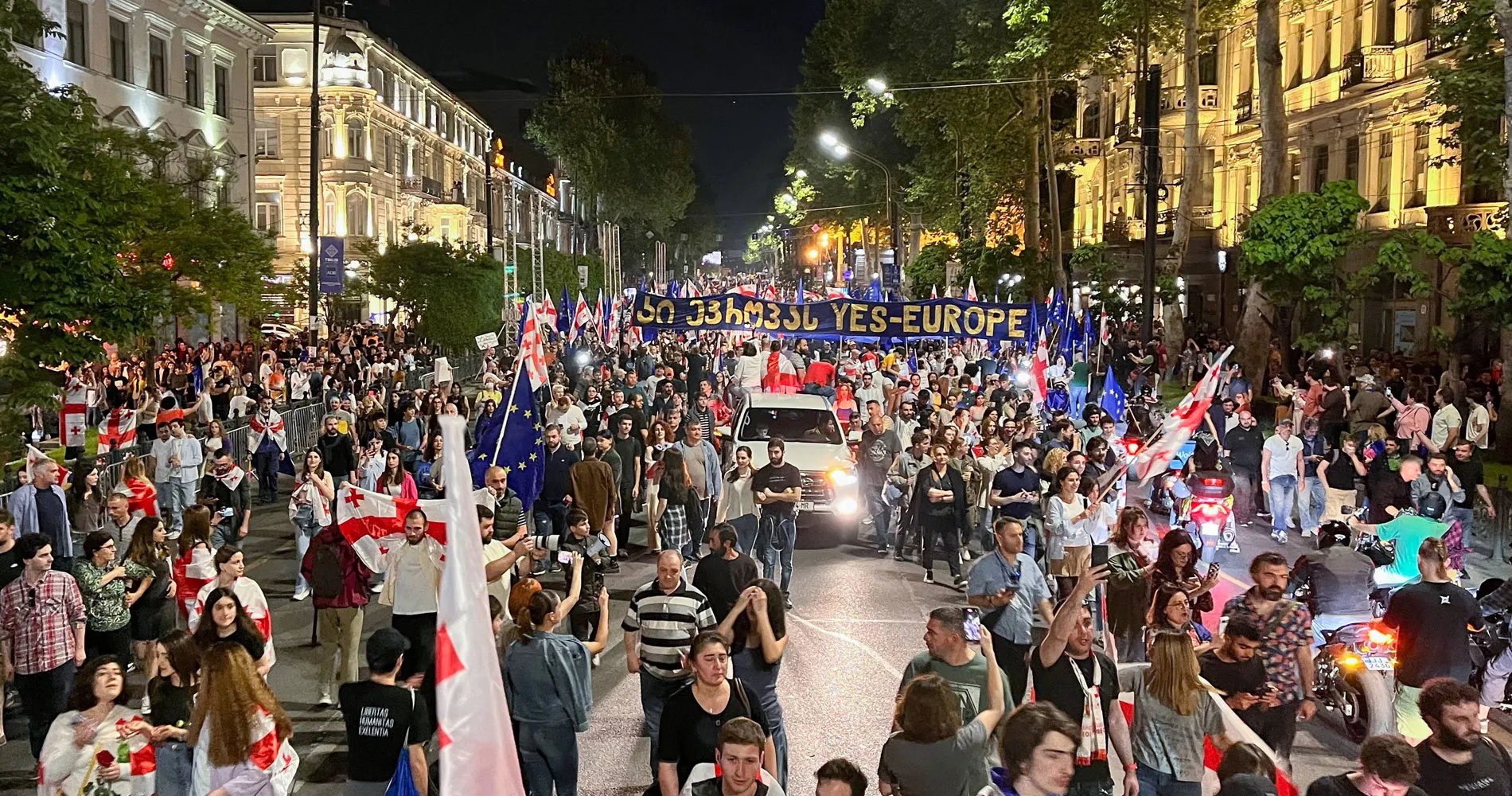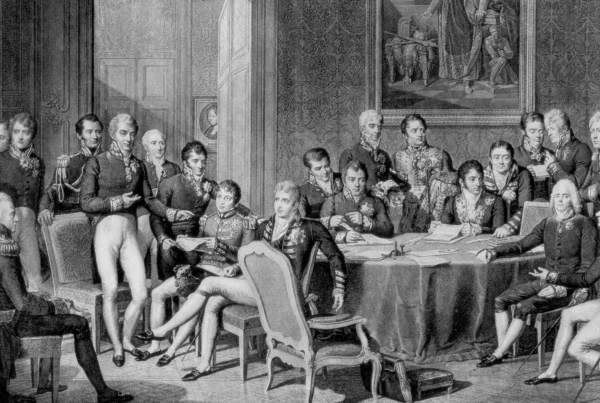Georgia has been engulfed in anti-government protests. The proposed Russia law, set to pass the Georgian parliament by the end of May 2024, requires all non-governmental groups and media organizations to disclose foreign funding/influence. Georgian Parliamentarian Armaz Akhvlediani gave iGlobenews an exclusive interview. He supports the protests, is strongly anti-Russian and believes the EU/US will fill any void once Russia pulls its considerable influence from Georgia. The governing Georgian Dream party is wary of the Russian bear and does not want the fighting in Ukraine to spill over to Georgia.
Diana Mautner Markhof
8 May 2024
Arabic version | German version
The Georgian capital of Tbilisi has been engulfed in protests for a month. Until very recently Georgia had embarked firmly on a political course which would lead to the integration with the Euro-Atlantic world. Marcel Röthig of IPS stated in a recent article titled A Trailblazer on the wrong track that: “The party leader Gharibashvili has finally expressed what many were thinking: The EU would neither be ready for enlargement, nor Georgia for the EU. Their [Georgia Dream] motivation seems clear: the candidate status is evidently enough for the ruling party.“
Georgia historically has had close ties to Russia – having been part of the former Soviet Union. The protests were triggered by the re-introduction in parliament of the so-called “Russia law” by the Georgian Dream party. Moscow implemented similar legislation in 2012.
In a nutshell, the law requires all non-governmental organizations and media outlets receiving more than 20 percent of their funds from foreign sources to register as organizations “carrying the interests of a foreign power”. They will be required to provide annual financial statements about their activities or incur fines of more than USD 9000.
Opponents of the bill, believe it will be used to crack down on those not in line with the governing party’s pro-Russian stance. This law, so its criitcs, will be a roadblock on Georgia’s road to EU membership.
The US has a similar law, the Foreign Agents Registration Act (FARA), which imposes public disclosure obligations on persons representing foreign interests. “Foreign agents“, defined in the act as individuals or entities engaged in domestic lobbying or advocacy for foreign governments, organizations, or persons (“foreign principals”), are required to register with the Department of Justice (DOJ), disclose their relationship, activities and any related financial compensation.
In April 2021, the Parliament, Commission and Council of the EU agreed on updated joint rules for more transparency when it comes to the activities of interest representatives at the EU level. The agreement was signed by the three institutions on 20 May 2021. According to the official EU website „the transparency register is a database listing ‘interest representatives’ (organizations, associations, groups and self-employed individuals) who carry out activities to influence the EU policy and decision-making process“. Currently, there are 12 580 organizations in the Transparency Register.
According to a 2024 Transparency International Report, Lobbying Transparency Across the EU the survey of the regulatory frameworks of 27 EU Member States and its three main EU institutions showed conclusively that a majority of EU Member states, namely 15, have already adopted mandatory or partially mandatory provisions related to lobbying. The remaining 12 Member States had voluntary or no provisions at all. Europeans overwhelmingly support more transparency when it comes to full disclosure of interest groups (and their financing) who aim to influence public policy.
Georgian Dream still supports Georgia’s European Union and NATO membership, but has taken a pro-Russian attitude. They do not want the conflict in Ukraine spreading to Georgia. The Georgia government gathered its own supporters in the tens of thousands to counter-protest in front of Georgia’s parliament in Tbilisi on 29 April. Georgia has learned the lessons of Ukraine’s color revolution and will likely not back down nor relinquish the streets to the opposition.
Armaz Akhvlediani, an independent lawmaker and member of Georgia’s parliament, gave iGlobenews an exclusive interview to discuss the events unfolding in Tbilisi, their impact on Georgia’s EU membership and the historical close ties to Russia. He supports Georgia’s EU membership. With over 30 years of experience in democratic governance, politics, and elections, including working with political parties, civil society organizations and legislative bodies the local and central levels, Akhvlediani knows Georgia’s political landscape very well. Akhvlediani is currently serving his third term. He is member of Georgia’s Parliamentary Committee on Defense and Security and of its Ethics Council. He is the Founder and Director of the Tbilisi School of Political Studies.
iGlobenews: On 14 December, Georgia received the status of “EU accession candidate”. How seriously does the government intend to pursue this accession? What chances does it have compared to other countries requesting EU membership, such as Ukraine?
Armaz Akhvlediani: Achieving candidate member status is the result of a long-term, tireless struggle for the democratic and European values of the Georgian people. The ruling party, led by oligarch Ivanishvili, then and now fiercely opposes this process, flagrantly violating the country’s constitution, which recognizes the European integration of Georgia as a priority. The governance style of the “Georgian Dream” administration excludes democratization and European integration. Through violence and moral terror, the party led by Ivanishvili aims solely to maintain power. However, most Georgian citizens strongly oppose this and strive to protect Georgia’s Euro-Atlantic choice. The victory of Ukraine in the war and its accession to the European Union are of fundamental importance to Georgians.
iGlobenews: The key condition for joining the EU is that Georgia must pass the reforms needed to qualify for entry. Observers believe Georgia might be moving in the opposite direction. For example, the recently passed amendments to Georgia’s law on broadcasting aimed at cracking down on hate speech could also be abused to restrict freedom of speech. Another such move by Georgian Dream legislators was the attempt to impeach President Salome Zourabichvili, supposedly for exceeding her presidential powers in foreign policy matters. Does Georgia want reform or is it sitting on the fence and wanting the best of both worlds?
Armaz Akhvlediani: The Georgian Government persistently fails to fulfil its obligations to join the European Union. Moreover, its actions blatantly obstruct the country’s European perspective. The legislative changes you mentioned serve as a dangerous tool in the hands of the government, being harshly wielded against dissenting media, organizations, and individual citizens. President Zurabishvili, despite her limited mandate, steadfastly advocates for the country’s European trajectory, a stance for which the government does not forgive her, even going as far as to prohibit crucial international visits intended for this purpose.
iGlobenews: The governing Georgian Dream party recently announced plans to re-introduce legislation which would require organizations that accept funding from abroad to register as “foreign agents”. Georgian organizations receiving more than 20 percent of their funding from abroad must register or face penalties. This law has been very controversial with mass demonstrations forcing the government to drop ist bid for this law last year. What are the chances this legislation will pass and what is your opinion on this it? Is this not a step away from the EU?
Armaz Akhvlediani: The revival of the Putinist law on agents of foreign influence makes joining the European Union virtually impossible. This law, previously withdrawn by the ruling party under public pressure and promises not to revisit the issue, resurfaces, posing a threat to critical NGOs and media outlets akin to Putin’s methods. Despite widespread protests by hundreds of thousands of Georgian citizens and daily calls from Western partners urging the “Georgian Dream” to abandon this initiative, Ivanishvili’s party obstinately persists in obstructing the country’s path toward European integration and democratization.
iGlobenews: How does Tbilisi currently envisage the settlement of the existing territorial conflicts with Abkhazia and South Ossetia? The constant repetition of the formula “we want territorial integrity” has not brought any results so far and, according to the latest surveys, the young generation in Georgia is increasingly losing interest in this issue.
Armaz Akhvlediani: The recipe for resolving conflicts in Georgia hinges on several key components: democratization of the country, integration into Euro-Atlantic institutions, complete detachment from the Kremlin’s influence, robust economic advancement, and the establishment of a unified, democratic, European state through reconciliation with Abkhazian and Ossetian citizens. Despite the challenges, I believe that young people grasp the significance of this issue and will play a crucial role in driving positive change in the future.
iGlobenews: The Russian invasion in 2008 effectively dismembered the Georgian state by enforcing the secession of the Abkhazia and South Ossetia regions which account for about 20 percent of Georgia’s territory. The 2004 precedent of accession of part of Cyprus (the southern part controlled by Greece) to the EU represents a constant challenge for the EU. With this in mind, can or should the EU incorporate a country, Georgia, that is partly occupied by a hostile neighbor? What differentiates Georgia from Cyprus?
Armaz Akhvlediani: The historical and geopolitical dynamics at play here are complex, but I believe the European Union recognizes the significant threats posed by the Kremlin and will fully extend its support to Georgia. However, ultimately Georgia’s ability to fulfil its obligations regarding democratization and the rule of law will determine the outcome. It is also crucial for the West to effectively counter the Kremlin’s malevolent intentions, drawing inspiration from Ukraine’s resilience. Furthermore, fostering direct dialogue with the Abkhazian and Ossetian communities is essential for achieving reconciliation and ensuring Georgia’s prosperous development as a unified state.
iGlobenews: What is Georgia’s position on regional cooperation in the South Caucasus? So far, controversies have prevailed, especially between Armenia and Azerbaijan after the last war over Nagorno-Karabakh. Without a community of interests between the three countries in the South Caucasus, they will remain a pawn in the hands of the great powers around them.
Armaz Akhvlediani: The South Caucasus has the potential to serve as a beacon of regional cooperation, democratic progress and stable, peaceful development. Achieving this vision requires rooting out the insidious influence of the Kremlin from the region and bolstering Euro-Atlantic partnerships, democratization efforts and mutually beneficial economic collaborations based on trust. Additionally, significant strides must be taken to rebuild trust among the people of the region. The recent positive developments, such as the normalization of Armenian-Azerbaijani relations and the increasing role of Georgia in the South Caucasus, coupled with the active involvement of Western partners and the diminishing influence of the Kremlin, are encouraging signs. These trends bring us closer to the realization of a unified democratic and secure space in the South Caucasus.







